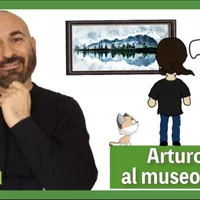Arturo va al museo d'arte / Storie semplici: 29
Arturo, Macchia e Mandarino stanno andando al museo d'arte. L'orario di apertura è dalle 9.30 alle 19.30 e adesso sono quasi le 18. C'è ancora tempo prima della chiusura e oggi l'ingresso è gratuito o almeno così crede Arturo...
Vigilante: Prego, signori, il biglietto.
Arturo: Mi scusi, ma oggi non c'è l'entrata libera? Vigilante: No, signore, mi dispiace. Quella è solo la prima domenica del mese. Dovete acquistare un biglietto. La biglietteria è là.
Arturo: Va bene, grazie. Che delusione! Pensavo di entrare gratis.
Mandarino: Io sono invisibile ed entro gratis lo stesso. Ehehe.
Arturo: Buongiorno.
Impiegato: Buongiorno.
Arturo: Allora, un biglietto intero e uno ridotto per il mio gatto, per favore.
Impiegato: Volete anche la visita guidata? L'ultima visita della giornata inizia proprio fra dieci minuti e dura un'ora e mezza. Fate giusto in tempo. La visita con la nostra guida, un bravissimo esperto d'arte, costa 15 euro a prezzo pieno e 10 euro a prezzo ridotto.
Arturo: No, grazie, preferiamo visitare il museo da soli.
Impiegato: Allora forse preferite l'audio-guida? Per tre euro in più avrete degli auricolari e potrete così ascoltare la storia e la descrizione di ogni opera d'arte che avrete davanti.
Arturo: No, grazie. Non è necessario. Leggeremo le didascalie.
Impiegato: Allora sono un biglietto intero a 10 euro e uno ridotto a 6... in totale 16 euro. Paga in contanti o con carta?
Arturo: Posso pagare con il bancomat?
Impiegato: Certo. Ecco! Il suo PIN, prego.
Arturo inserisce il PIN a cinque cifre e dopo un po'
viene fuori la ricevuta di pagamento.
Impiegato: Un attimo che le do anche un depliant con la mappa del museo. Ricordate che è permesso fare fotografie, ma è vietato usare il flash. Ok? Buona visita.
Arturo: Grazie mille. Buona giornata.
Arturo, Macchia e Mandarino cominciano la visita dalla sezione dedicata alla scultura. In questa sala ci sono tantissime statue.
Arturo: Allora, qui abbiamo i busti di importanti personaggi greci. Sembrano veri. Gli scultori erano davvero bravi.
Mandarino: Sono tutti ritratti di fantasmi.
Arturo: Cosa dici, Mandarino?
Mandarino: Guarda! Sono bianchi, pallidi, come me. Sono fantasmi. È chiaro.
Arturo: Ma no! Sono ritratti di persone che vivevano tanto tempo fa e poi il marmo è bianco adesso, ma prima era colorato. Quindi non erano pallidi. Mandarino: Se lo dici tu. Per me, sono fantasmi.
La visita continua nella sala dedicata alla pittura dove c'è un bellissimo affresco sul soffitto e una mostra di quadri di pittori famosi e meno famosi.
Arturo: Questi dipinti qui fanno parte dell'esposizione permanente del museo. Mandarino: Cos'è un'esposizione permanente? Arturo: È una collezione di oggetti e opere che restano per sempre in questo museo.
Mandarino: Ah ok, una collezione fantasma.
Arturo: Ma cosa dici, Mandarino?
Mandarino: Io resto per sempre su questa terra e sono un fantasma. Sono permanente anche io. Quindi un'esposizione permanente è un'esposizione fantasma.
Arturo: Vabbè, non commento. Che bello questo paesaggio. La didascalia dice che si intitola “Serenità” ed è uno dei capolavori della pittriceEmma Pronia del 2003.
Macchia: Miao.
Arturo: Sì, Macchia, è un acquerello, cioè l'artista ha prima bagnato il pennello in acqua, poi l'ha passato nel colore e infine ha applicato quel colore su un cartoncino.
Mandarino: E questo cos'è?
Arturo: Questo è un dipinto a olio su tela di Sergio Cerrato del 1998. Il titolo è “Silenzio”. Molto bello, vero? È una natura morta.
Mandarino: Ah, è frutta fantasma?
Arturo: Mandarino, basta con questa storia dei fantasmi. “Natura morta” è un genere artistico. Tra i generi artistici ci sono i ritratti, il nudo, i paesaggi e la natura morta è un genere in cui l'artista dipinge oggetti inanimati come frutta, bottiglie, vasi e così via.
Mandarino: E quello cos'è?
Arturo: Lì c'è un'esposizione temporanea di arte moderna. Vediamo... Questo è un quadro astratto di Alessandro Lessinchi del 2022 che si chiama “Infinito”.
Mandarino: Ma io non vedo nulla. C'è solo una cornice e una tela bianca. Bianca come me, quindi una tela fantasma.
Arturo: Basta, Mandarino. Non è una tela fantasma e non è completamente bianca. Non vedi che c'è un puntino nero al centro della tela? È un puntino nero fatto con una matita a carboncino.
Mandarino: Ma questa non è arte! Anche io so mettere un puntino su una tela, guarda!
Arturo: No, Mandarino. Cosa fai? È proibito toccare o rovinare i quadri!
Arturo corre a fermare Mandarino, ma nella fretta calpesta la coda di Macchia. Macchia salta per il dolore, vola sul quadro davanti a lui e con le sue unghie fa dei lunghi tagli nella tela.
Arturo: Oh no, che disastro! Presto, nascondiamoci! Sta arrivando la guida con alcuni visitatori.
Guida: E qui abbiamo un quadro astratto dell'artista... Che strano! Perché qui c'è un quadro di Lucio Fontana? Ehm... scusatemi, sono confuso. Fino a pochi minuti fa qui c'era un altro quadro. Ma questo è chiaramente uno dei quadri di Fontana, il famoso artista argentino che fa lunghi tagli nella tela. Non capisco...
Arturo: Ragazzi, andiamo via subito o ci uccideranno. L'uscita è di là. Presto! Presto!

